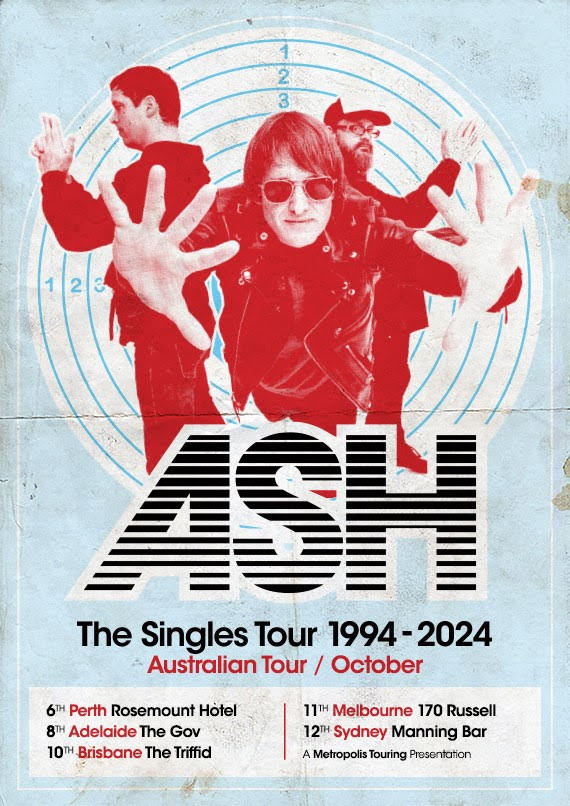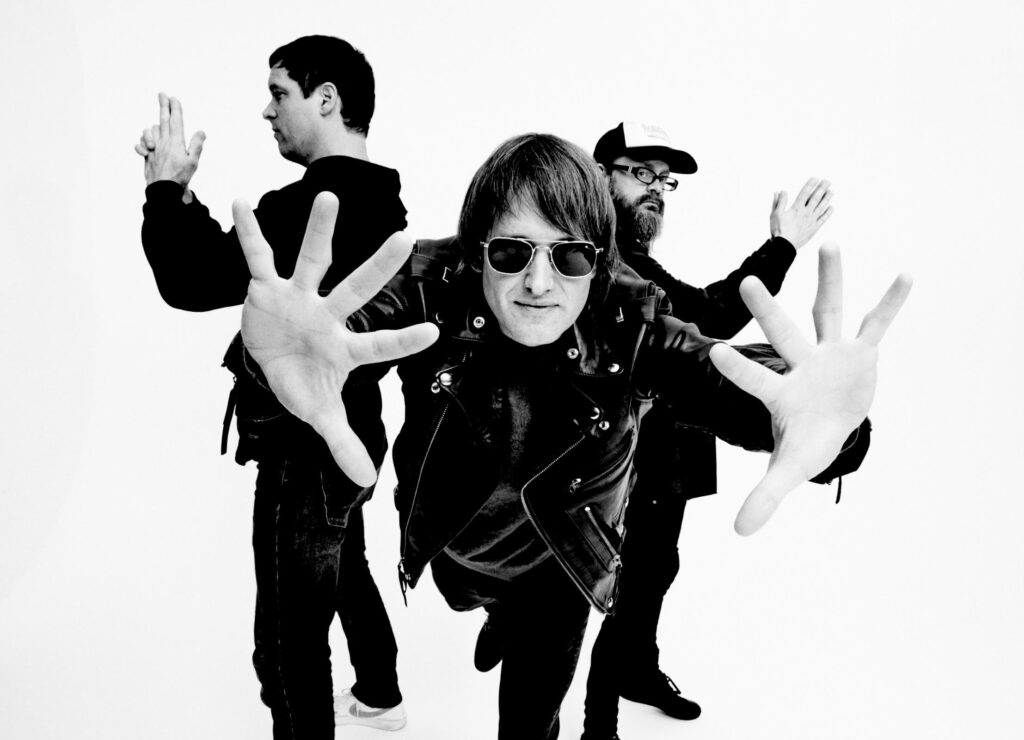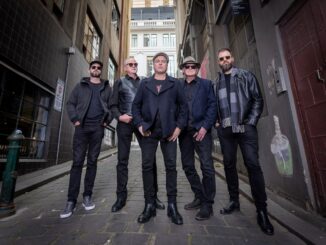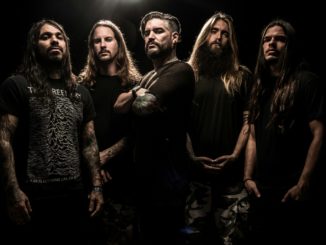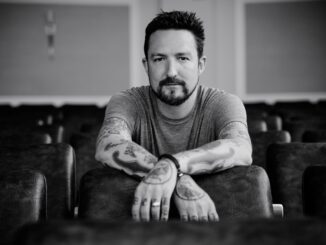It’s funny how thirty years can pass in the blink of an eye. How music is the soundtrack to life. Northern Irelands Ash were adopted by then Australian radio institution Triple J and the constant airplay made them a name that a generation wouldn’t soon forget.
After more than ten visits to Australia during this time Andrew Slaidins sat down with Ash Vocalist/Guitarist Tim Wheeler as they talked about the bands connection with Australian, their history of singles and the longevity of the band.
Tim : Hiya.
Andrew : Hey Tim. How are you, mate?
Tim : Very well. How are you doing?
Andrew : Really well. Thanks for joining me and thanks for spending some time with The Rockpit.
Tim : Yeah. It’s good to be in The Rockpit.
Andrew : The big exciting news is that in a couple of weeks is that the band are about to embark on the Australian leg of The Singles Tour 1994-2024.This year also marks the 30th anniversary of the band. What’s the secret behind keeping the founding members of a band together for this long.
Tim : Well we love working on new material all the time. There’s always something fresh going on with us and we love playing live together. We still get on really well. We’ve kind of been through all kinds of chaos together. I guess it’s taken a lot of togetherness to survive all the industry changes that we’ve been through and to still be doing it. I also attribute it to the fact that we’re very lucky to have like a great audience that comes to see us live. We’ve had a lot of great live shows over the years and have an awesome following. We’re very grateful for that.
Andrew : You certainly do have a very loyal following and that’s something that that’s not easy to achieve these days, even more so over the course of thirty years. Back in the early days of the band, there were a lot of titles and genres that you guys were trying to be thrown into. I think the one that probably annoyed me the most was that whole Britpop title that was thrown around. How did that sit with you guys as a young band that were finding their stride?
Tim : Hahaha. Yeah. We didn’t love it really, we were way more American influenced, we were kind of a blend, we grew up loving all the kind of British groups just as much as the American groups. But, the Britpop thing was definitely very English, you know, like we’re, and we’re Northern Irish. It seemed to be about celebrating English music really and even rejecting American music, like post grunge rejecting the whole grunge scene. We love that stuff and that influence kind of stayed with us. We didn’t love being labelled with it, but there were definitely some perks to it. Like we’d go to Japan and that whole Britpop scene was really big in Japan even in places like San Francisco that scene was big there. Sometimes we’d go places and it would open doors for us which was great I don’t know. As with any scene, you know, it’s always going to sink at some point, and we didn’t want to go down with that shit at all (laughs).
Andrew : Here in Australia you’ve had a long running history with us and grown a really loyal fan base. From the very beginning Triple J embraced you guys. You’ve toured here quite a few times and that has certainly maintained that fan base through touring. I actually tried to figure out, how many times it’s actually been, do you know off the top of your head?
Tim : It could well be 10 tours over the years. I’m trying to think even in the last 15 years, we must have done 6 or 7 tours, it’s been a lot. We have definitely come out on every album. Yeah, yeah, yeah. There were quite a few early on too, I know we came out on our first mini album even before 1977 had come out. We’ve done the 1977 anniversary tour as well. So yeah there’s been a lot of visits to Australia and we are very grateful for that.
Andrew : From the debut to last year’s “Race the Night”, what do you think has been the biggest growth and change in the band?
Tim : I think it’s the confidence in knowing what we’re doing when we are recording. Early on, we didn’t really have a clue what we were doing in the studio. We’re lucky we have had great producers guide us. When we worked with Owen Morris, the Oasis producer, he was probably the one that like helped shape our sound a lot and opened us up to exploring a lot of different things in the studio. He had us using string sections on 1977. When we started out, we never would have sort of entertained doing that; he was very good at convincing us to try new things and since then we’ve sort of had an experimental approach where we like trying to add new ingredients. I’ve become quite a decent producer over the years and I’m an engineer as well. So, I do a lot of that stuff now. One thing in common though is we like to kick a song into shape in rehearsal room and the final finished recording never ends up being too far from what we’ve got in rehearsal. If it kind of sounds good in the room with just a few of us playing, then I know we can kind of dress it up well, but we don’t want to go too far from, from that in the studio. That’s our philosophy.
Andrew : That first four or five years that the band really started gaining traction. How relentless was that touring cycle for you guys and how relentless was the industry on you at that time? Did it come at a cost personally?
Tim : Yeah definitely. It was kind of crazy, you know, I don’t think we were quite ready for it. With success we were wanted in a lot of countries and the travel was just constant. When we weren’t playing or traveling, we were doing a lot of interviews and press, going to radio stations or doing videos. It was really full on, our management and label really pushed us hard. There were a few times where we were like we just need a bit of time off here. But I understand why they did it, sometimes I wish we’d like had the endurance to like go even further. Because maybe we would have been bigger, but then who knows if we could have handled it. By the time we started like really working on America, we’d done so much touring in the UK and Europe that we’re kind of burned out. We had some good opportunities in America that we didn’t maximise on, I think we were, well, too drunk. There were things like going to MTV and stuff like that where we were just drunk assholes. We should have like played the game a bit better, but we were just so burned out that we didn’t.
Andrew : Is there anything that you wish Tim from 2024 could go back and tell Tim from 1994?
Tim : Yeah. I guess there’s a few things I would go back and tell myself. The main one would have been you need to carve out a bit of space and time to write songs, um, that will get you if you don’t. I’m mostly thinking about our second album, you know, when we came to making that, we were so exhausted that I hadn’t had any time to write any songs for a long time. I wish I’d sort of carved out a bit of space to keep writing, it wouldn’t have been so much pressure to make that record. We learned how to do it over the years and we learned how to deliver under pressure as well. It’s something that you can only learn by doing it
Andrew : With this being The Singles 1994 -2024 tour, something I learned while researching for this interview is that there have actually been 64 separate Ash singles throughout those years. So how true is this title?
Tim : (laughs) Yeah, I don’t think we go out and play 64 songs (laughs). Even though some of our songs can be quite short and snappy it’s gonna take way too long. The number of singles is definitely inflated thanks to the one year where we put out 26 singles. That was a bumper amount. Even if you take those out of it, that’s still a hell of a lot of singles. We have a hell of a lot of material. It’s gonna be fun to choosing from our catalogue. There are definitely songs we know that people really love and love to hear, but one thing about doing this tour is that it’s quite a fun chance to play a bunch of the early singles as well. Some of them have not been in the set for a while, so that’s gonna be cool.
Andrew : Looking back at when you made that decision to go and release those 26 singles, that have become known as the A to Z series, it’s almost like you guys had a crystal ball to the future and could see what would be happening 15 years down the track and how the music business would model itself. Was that something that you decided to do out of frustration? Or was that something that you genuinely felt was happening and the industry was heading that way?
Tim : It was a bit of both. It was like, okay, we saw that albums, you know, CDs were like, just, it was probably, it was finished for that. We talked a lot for a manager and he had a good insight on the industry and we knew we had a chance to try some really different ideas. It was around the same time Radiohead released “In Rainbows” for free, which was quite a mind-blowing idea at the time. Just giving an album away. But, that was such a sign of the times; album sales were gone. We have always loved making singles and we’ve had like a good history as a single band, why not do this? It was just a bit too early for our idea, it would have been like perfect if the streaming platforms had already been set up really strongly at that time. We were just before it; we did our own subscription model and it was our first time on our own label. We didn’t have the huge resources to advertise it that we would have had if we’d still been on a major label, but I don’t think a major label would have been able to do what we did, their system probably couldn’t have handled that idea at that time so we did it all independently. I think it would have been an absolutely perfect thing to do ten years later, it would have been brilliant.
Andrew : Through the course and the history of the band, certainly in that first decade, movie soundtracks and video games gave you guys some amazing exposure. Was one of those particular projects that stands out as being more significant than the others?
Tim : Yeah there were certain things we did in different regions, we had a Heineken ad in Ireland that for our second or third single, ‘Uncle Pat’ and when we go to Ireland, people just think of this Heineken advert, and that fine it doesn’t trouble us but it has meant that that song is like bigger when we play in Ireland, fans really know and love that. My personal favourite was probably when Jackie Chan used ‘Kung Fu’ in the movie Rumble in the Bronx. It plays over the blooper reels of all his like stunts going wrong at the end of the film and that was so cool because it had been out there as a single as a tribute to him. It was pretty special when it got picked up the following year and it was put in the film; that was fantastic. Then some computer games put us into like the homes of so many teenagers around the world as well you know. We’re lucky with the Gran Tourismo game, I think the game came free with Playstation consoles when people bought them and it sold millions and millions of copies, so that was amazing.
Andrew : Now going back to, I guess, previous tours in Australia, do you have a favourite moment in Australia?
Tim : Um, maybe like, our very first tour was just so fun. I do remember being really jet lagged and then like, Mark, we were on a tiny stage, I think at the club in Melbourne and I think Mark came across the stage and stood on my foot, or stood on my ankle, and it totally twisted my ankle. I had to play that show in a lot of pain, but that was brilliant. Oh, and we did the big day out tour in 1999 and that was amazing. That run felt like, there was a lot of days off on it and because people started to call it the big day off (laughs).That was probably the most time I got to spend on tour in Australia, where there’s a lot of great side shows, and I got to see a lot of great bands, and it was a great scene. Being on the planes of with all the other bands, you know, going between the cities it was just a great time. That’s maybe my favourite tour of all time, actually it is that one for sure.
Andrew : I realize that your schedule is absolutely hectic this evening, and I really do have to thank you. I’m really looking forward to this tour. I think it’ll be a great time for everyone.
Tim : Oh thank you so much. There’s an energy we get back from a Ash crowd that’s always amazing and you guys in Australia are great. I mean, you guys have always been amazing to us and we can’t wait to get back there, play some great shows and see you all.
Andrew : Again, thank you so much for your time tonight, Tim, it’s been great chatting to you. Travel safe and we’ll see you here soon.
Tim : Thank you. Yeah. I wish we had longer. Maybe we’ll catch up again next tour.
Andrew : Yeah, let’s, let’s do it next time.
Tim : Thanks Andrew. Thanks so much. Catch you soon. Cheers.
A huge thank you to Metropolis Touring and Tim for the access.
